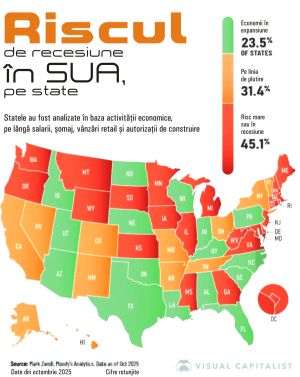
Radu Soviani: How do you see the major privatization in Romania after 30 years?
Petre Roman: The major privatization has recorded, let's say, a normal trend, meaning in such a way that the economy is largely privatized, without which we could not have the chance of a Western-compatible economy, a real market economy, and at the same time, the major privatization meant, in many aspects, a failure compared to what private activity could have been based on the reality, the fabric, primarily industrial, that existed in Romania.
Radu Soviani: In what way was the initial desire short-circuited? You enacted the first privatization law.
Petre Roman: I enacted a law that, at that time, was considered in the Western world to be the best law, the most efficient privatization law, the one we adopted in August 1991. It had an interesting privatization scheme. The State Property Fund and 5 funds of private property where each Romanian citizen obtained something from what they had worked together for so many years. And it was a very good basis for maximizing what exists. In the same month, August 1991, the executive vice president of McKinsey, the major audit company, proposed to me: "Look, we will conduct an audit of the restructuring of Romania's economy, we don't ask for any money because your experiment, your reform, seems very serious, we are interested, and we will do this analysis, this audit, as quickly as possible." In a month, the audit was done.
Radu Soviani: August-September 1991.
Petre Roman: Yes. And I have the document. Very interesting, absolutely all sectors of the Romanian economy, meaning restructuring, the identification, of course, of the huge vulnerabilities in the Romanian economy, the Ceauşescu era, especially vulnerabilities accumulated in the black decade, the eighth decade, in the "80s, but in the discussion we had when they presented the document, a very interesting thing emerged. Namely, they said: every economic activity, every enterprise in Romania has at least one viable economic activity in its operation, at least one, in the sense of privatization. In other words, what privatization should mean? To capitalize on these viable economic activities. That was the point. Here, major failures intervened.
Radu Soviani: Before you were overthrown by the miners' riot, by the coup...
Petre Roman: Of course, yes, a coup, as historians have said.
Radu Soviani: Was it also from the privatization point of view? Do you believe that the openness to privatization was a reason?
Petre Roman: Yes. I believe that there was a political knot, a knot of political and economic interests. I don't want to exclude that there were people who sincerely believed that this radical transformation of the Romanian economy was dangerous. It's something that Alexandru Bîrlădeanu publicly affirmed, unfortunately he was nothing more or less than the President of the Senate. Ion Iliescu listened very carefully to what Alexandru Bîrlădeanu or Dan Marţian and other economists said, such as NN Constantinescu, who was clearly an economist in favor of the previous socialist system, it's a known fact, and together with political interest, all these led to the blow by which I was removed so brutally, violently, and with very serious consequences, including in terms of Romania's image, for Romania. There followed about five years of stagnation and breaking away from Romania. On the contrary, we returned to a subsidized economy. This happened from 1992, first with Stolojan and then with Mr. Văcăroiu - we returned to a subsidized, loss-making economy.
Radu Soviani: We were at a point - you had almost finalized deals with Siemens, Fiat, Mercedes...
Petre Roman: With Mercedes, we had finalized the deal because the president and CEO of the group came here in February 1991, a man who knew the Romanian economy, had been in Romania, an admirable man who came and said to me, "Mr. Roman, as you know, we were encouraged - a mild word, but in fact they were pushed by Chancellor Kohl, following the visit I made to him on November 29-30, 1990 - to come and work in Romania." Now, after 30 years, I think the most important moment for serving Romania's interests - there were many - but the most important, more complete, was, I have to admit, the meeting with Helmut Kohl, who showed great sympathy for me, but beyond sympathy, I found that he had practically prepared a complete opening of Germany to Romania. It is certain that after I had a long one-on-one meeting with Chancellor Helmut Kohl, who was then the giant personality of Europe, he said: tomorrow you will meet with all the cream of the German industry. And indeed, we were in Bonn, we went to Poppelsdorf Palace, and in the hall were the CEOs of all the major German companies. The amazement was so great - how could I face such a...
Radu Soviani: Probably each CEO led a company worth as much as Romania's GDP.
Petre Roman: It's possible, it's likely. That's how the president and CEO of Mercedes came, in February 1991, said they were supporters of our reform and that he came to us very pragmatically: "Mercedes does not build buses or trucks anywhere else but in Germany. But if we agree, we will build Mercedes trucks and buses in Romania." February 1991: "We have examined the two companies - Camioane Roman in Braşov and Autobuzul in Bucharest, there are many things that are not at all right, but we have something to work with." And then I said, "You have to wait a little longer because I can't make this decision, I'm thinking if I could have forced things at that time, but here I would have certainly encountered Iliescu's resistance, who had manifested himself on another occasion, earlier, to adopt the privatization law that was in progress, and then I support you as the Romanian state to privatize these two enterprises, for the benefit of Mercedes. The two enterprises no longer exist. At all!
Radu Soviani: In what sense could you have forced it? Or maybe forced your removal earlier?
Petre Roman: How could I have forced it? To have adopted a separate law, we had a majority or at least it seemed so, it was proven at the time of the coup in September 1991 that there was a majority favorable to the Petre Roman Government. But it would have meant a forcing, because President Iliescu would have said to me, "No, we don't have a privatization law, let's wait." That's for sure. I had an episode, true, in even less legal conditions, in terms of the legal framework. In March-April 1990, I sent General Spiroiu to Saudi Arabia because there were a series of military equipment, weapons, and the issue was that Saudi Arabia wanted to buy them. He came back and said, "The people in Saudi Arabia would like to buy the Teleajăn refinery. They offer $400 million."
Radu Soviani: Romania has never received so much for any of its refineries.
Petre Roman: When we sold it to Lukoil, I think it was around $50 million. I said, let's do it, because this money... Iliescu opposed it, said we couldn't do that, we are a provisional power, so we don't have enough legitimacy for such privatization. This happened with Mercedes. Then, something similar and equally dramatic happened with Tractorul. The Executive Vice President of Fiat came here and said, "We are interested in Tractorul Braşov. It's clear you have a market, but there are problems with your tractors, they are very reliable, but they are too low-powered. It's not done like that anymore, we have to increase the power." But we are willing to privatize, to use all the technology, to use the market we have and expand the market. Tractorul no longer exists. As a result of the meeting with Helmut Kohl, Siemens also said it was interested in Locomotive Electrice Craiova. They had a very good license, Brown Boveri, the locomotives are still impeccable, technologically, after so many years. The enterprise no longer exists. This illustrates what I was saying earlier, namely the failure point of the major privatizations.
Radu Soviani: But who are the real beneficiaries? And here I will ask you to detail on two components - 70% State Property Fund, 30% vouchers.
Petre Roman: The beneficiaries of the liquidation of these enterprises were those who privatized knowing very well that they would not continue industrial activity but would take over the lands. In some cases, the value of the lands and the size of the accounts was much higher than what they paid. So they paid a sum, and the sums in the accounts were larger, not to mention the value of the lands. So, something scandalous. That was it. It was the moment when the dismantling of the functioning of the Romanian economy turned into the dismantling of the economy itself - which should not have happened. The privatization law did that: it changed the way things worked but tried to preserve as much as possible from the industrial fabric.
Radu Soviani: Did it go better or worse on the voucher component?
Petre Roman: No, it went very badly. As you know, we had the 5 FPPs in which each had a property certificate. It was a well-thought-out thing. After that, to eliminate any connection with the Roman government, which was madness and of course the return, as I was saying, to a mode of operation of the 80s, so subsidized loss, they introduced another formula, with vouchers, which was a purely political issue, political propaganda, criminal, undermining the national economy, effectively undermining the national economy because the million and the voucher were mentioned. Pure propaganda. People didn't believe it completely. Proof that in 1996 Iliescu and the PSD lost the elections. But the years when the country was led by the red quadrilateral were the years of rupture for Romania, so lost years in terms of economic transformations.
Radu Soviani: Looking back, do you think anyone tried to speculate for personal gain?
Petre Roman: There have always been personal interests.
Radu Soviani: From which area?
Petre Roman: From the area of those in power: PSD plus its allies. Of course, there were interests. Let's remember a simple thing: Bancorex, which gave hundreds, thousands of loans that were not even thought to be recovered someday. What more concrete example do you see?
Radu Soviani: And yet, they had 8% non-performing, less than the 30% of the banking system in 2008.
Petre Roman: Yes, but once Bancorex was forced to finance the imports of raw materials that the enterprises no longer paid for, those 2 billion dollars accumulated and destroyed one of the very respectable banks in Europe and even in the world. Bancorex was a remarkably well-placed, resilient, solid bank, they turned it into dust. And now I still think we shouldn't have accepted its dissolution. It was practically liquidated, what more... It was very complicated because, unfortunately, during that period when we returned to power, Romania's image was very bad. The IMF had the idea that Romania would default, which was false, we had no problems. We simply entered into a foolish scheme, as often happens, because the IMF had many foolish schemes, to save the bank, you had to inject money, which would certainly have been complicated.
Radu Soviani: Could the SIFs, which were shareholders at Bancorex, have done it?
Petre Roman: I can't tell you now. But I think if you talk about this issue with Eugen Dijmărescu, I think you can find out what scheme we could have used to save Bancorex. And Banca Agricolă was an important bank. It was also liquidated.
I'll give you an example that might upset many people, even in good faith, but it's a reality. When Bancorex was privatized, why was it necessary for that Bancorex building to be offered to BCR for free? $2500 was the book value. Why offer a building that cost several million for free, which meant a huge heritage? Why? Very unpleasant.
Radu Soviani: Why offer 30% of the economy for free, through vouchers, to countries that were the heads of the FPPs and current SIFs?
Petre Roman: Yes, and that happened. Those who became the owners of the FPPs were politically appointed. All from the PSD. It was a scheme. A political scheme. A political scheme certainly harmful because these FPPs did not advance as they should have worked, namely as real investment funds. They did what they did. It's an analysis that deserves to be done, but it should be done through a proper audit.
Radu Soviani: There is a study by the Association of Investors in SIFs, which says that the million and the voucher, as you said...
Petre Roman: That was the slogan.
Radu Soviani: A hundred lei at that time in an SIF is worth in 2020, so almost after 30 years, 820 lei, without taking into account the inflation rate of 3300 percent. With the inflation rate, the hundred lei, million and voucher, is worth 24 lei. How do you find this amount?
Petre Roman: Yes, it is significant without a doubt for this privatization process and undervaluation.
Radu Soviani: 7 million shareholders who still don't know they have shares in SIFs...
Petre Roman: Yes, that's right.
Radu Soviani: Who bet that there would be no interest?
Petre Roman: There were people who took advantage of this. They bought. But that's the market. People sold them for almost nothing because they thought they were worthless, and some made a very nice capital, with which some even achieved exceptional things. One of the people who did this, and achieved something, was Dinu Patriciu, my good friend. That was it. With the money he had, he invested in vouchers and was able to buy all sorts of assets-among his first investment actions in the economy. That's not wrong.
Radu Soviani: Dinu Patriciu is no longer here. But I would like to ask you, perhaps he came closest to the notion of an oligarch, that is, a powerful man...
Petre Roman: No, he wasn't an oligarch. I knew Dinu Patriciu so well, he didn't engage in financial speculation. Never. The way the capital he accumulated dispersed and the result was his disappearance from life shows that. He didn't leave something he just laid his hands on. No. He started from an enterprise that was super-indebted, seriously under-technologized, turned it into a large international company. What does that have to do with oligarchs? Zero!
Radu Soviani: But does Romania have oligarchs, Mr. Roman, after 30 years of privatization?
Petre Roman: Maybe it has, I don't know? You should know better than me. For me, oligarchs are people who get their hands on a state asset under a political cloak and suddenly become very rich. Well?
Radu Soviani: Well, at the SIFs today, we have people who lead the SIFs...
Petre Roman: Yes, yes. Probably, at a lower level, there is probably such, let's say, such a path of oligarchy. There couldn't not be in Romania because that happened as a result of the fact that privatization was rushed, something that needed to be done, but fundamentally, a law had to work. And the law existed. If that law had been applied, I don't think we would have had the most serious situations we had.
Radu Soviani: The SIFs no longer have 30% of the economy now, much less. Taking stock, was it a good idea or not?
Petre Roman: I am convinced that there was no other possibility in terms of support for the population. You had to offer the population something for the work that generated the entire heritage. It couldn't be otherwise. And we found this formula, that is, the state retains 70%, and the remaining 30% is divided into five areas, into five investment funds. I think the formula was good.
Radu Soviani: And the result?
Petre Roman: The result is that it no longer worked. The law was practically abolished. The law, as soon as the Văcăroiu government was elected, one of the first measures was to abolish Law 51 from August 1991.
Radu Soviani: Do you think anyone could have bet on this? I mean, there are people who wanted million and voucher...
Petre Roman: It was a political move, as I said earlier. That was a nasty thing - we offer you the voucher and the million.
Radu Soviani: At one point, Mr. Stolojan told us that Mr. Hrebenciuc was very curious, very curious: "Could 975,000 lei work in addition to 25,000, to make up the voucher and the million?"
Petre Roman: Yes, well, that was a kind of idea, how to stay in power at any cost through serious demagogy. Demagogy is more or less serious... This was one of the serious or very serious ones.
Radu Soviani: At some point, Ion Ţiriac said that Romania doesn't have rich people; it has the wealthy. Do you think those who privatized or are the real beneficiaries of privatization, through decapitalization, through non-revaluation of assets, knew?
Petre Roman: Some did a good job. They did a good job. We still have entrepreneurs in Romania who started from an existing base and developed it as it should have been developed. Some of those developments were later taken over by other companies, larger, foreign, as is natural. As you know, the law of capitalism includes only growth. Decrease means death. That's the fundamental logic of capitalism: either you grow, or you die. There is nothing else. Fernand Braudel said: capitalism does not die. The capitalism of the grandfather dies, the capitalism of the father dies, but the capitalism of the child and the grandchild appears. The cycle continues. So there were missed opportunities.
Radu Soviani: I look back, I see images from the Romanian Revolution: "We want a democratic government!"
Petre Roman: There was a democratic government. That was the first government, installed on December 27, 1989.
Radu Soviani: The Roman government came, a democratic government, there was a decision at the beginning to distribute the social parts, which were a kind of shares...
Petre Roman: Not a distribution. It was a bad decision, but the pressure-I can tell you I was the last one on the barricades, saying no. I had a great man by my side, an extraordinary man, who was a communist dignitary but an exceptionally qualified person, Ion Păţan. He was a man of remarkable quality and the finance minister. I kept him, even though it caused a scandal. But I realized that he was a very capable and serious man in his approach. And he told me, "Mr. Roman, we already have inflation. We're just pumping up even more inflation." I resisted. Iliescu gave in. You know, street demonstrations had started - "give us back our money, thieves!" A whole madness. I resisted until one day when Mr. Păţan came and said, "Mr. Prime Minister, we have nothing left to do. Let's do it in the most bearable way." It was a huge amount - 17 billion. Can you imagine? Of course, everything went into inflation, slowly, not immediately, but it certainly had a positive aspect, in the sense that it helped compensate for the decrease in economic activity. A decrease in economic activity was inevitable; there were many economic activities in loss, and on the other hand, work discipline was no longer what it used to be. Let's be clear; it wasn't the same as in the 1980s under Ceauşescu. So, the social parts were not a good decision, but it was an inexorable decision related to the voice of the street, which shows us once again that the voice of the street is not always the voice of reason.
Radu Soviani: What can you tell Romanians who had high expectations from mass privatization 30 years ago?
Petre Roman: It's too late to tell them now...
Radu Soviani: Or their descendants?
Petre Roman: It's too late. First, the transformation of the Romanian economy into a private economy was a process that was too long, and it was felt, although the transition to the other side of the barricade was a great success. In my study, I found an important example. Between 1998 and 2018, 20 years, the total growth of the economy in Germany is 134%, France 127%, Italy 102-103%. In Romania, it's 610%. It's still impressive. And in terms of purchasing power parity, it's 7 times. It's still something serious.
Radu Soviani: NATO, the European Union...
Petre Roman: Anyway, this very positive quality is recorded. It was only possible through our common path with the European Union. It's certain. I would also like to mention a charming episode with Ion Păţan. When Nixon came to Romania in 1969, Nixon was so impressed that he said, "We open all the roads for you in the USA, for trade, whatever you want." The Minister of Commerce was Ion Păţan. And Ion Păţan was immediately invited to the United States and met with Richard Nixon. Ion Păţan didn't speak English. Somehow, following this meeting, Nixon became passionate about Ion Păţan. Ion Păţan, no one knows exactly, 12-15 times, met with Richard Nixon. He didn't ask - at the White House? for what? no. Whenever you want! He was a man with very clear, very transparent thinking, a disinterested man. He died in his apartment, a small apartment in a block. Although he was a high official, he was a minister, he was my adviser. In my legitimate government, I certainly kept him. I had 3 top-notch advisers: him, Gheorghe Caranfil on Industry, and Sever Georgescu on law, the former deputy prosecutor general. That helped me a lot.
Radu Soviani: Thank you very much for your kindness!























































